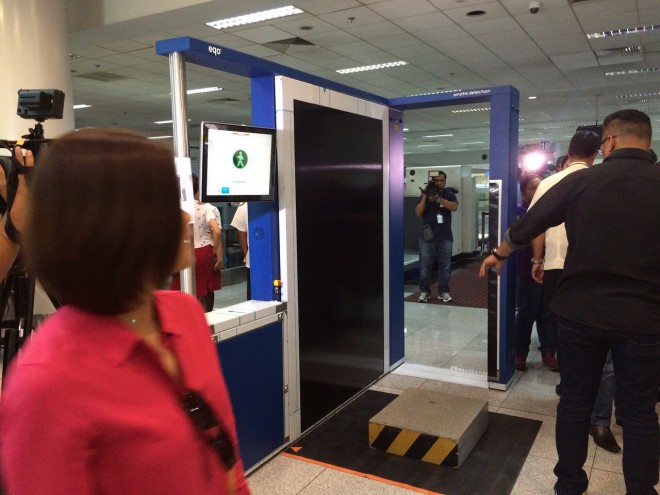New Naia body search won’t leave you naked
They will strip you down but won’t leave you naked.
Passenger privacy was the main concern of the Manila International Airport Authority (MIAA) in setting up 14 new full body scanners in all four terminals, doing away with pat-downs and personal space invasion.
Called EQO model portals and manufactured by Smiths Detection Inc., the scanners cost some P150 million. They are expected to be used within the month in all Ninoy Aquino International Airport (Naia) terminal departure areas to detect concealed foreign objects on a passenger’s body.
Smiths Detection is a US-based company that develops threat detection equipment and screening technology for military and transportation security applications.
According to local distributor Defense and Protection System Philippines Inc. (DPSPI), the scanner bounces harmless millimeter waves off the body and analyzes the reflected data using a generic outline graphic to highlight detected items both metallic and nonmetallic.
Article continues after this advertisementPrivacy protected
Article continues after this advertisementIn Tuesday’s scanner demonstration at Naia Terminal 3, DPSPI president Jose Mari Castañeda said: “It (the scanner) does not penetrate the skin. It will practically strip a person but with the privacy protection (installed), it only shows a caricature of the person.”
Castañeda said the MIAA specifically required privacy protection because of the machine’s function of stripping a person down to the skin.

Castañeda also said the machine would not indicate if an item was dangerous but only alert the screener to the location of a foreign object on a passenger.
Training
On the equipment’s accuracy, Castañeda said, “I think it is pretty accurate but if you put a good machine then you should also have a good screener.”
Office for Transportation Security personnel are undergoing training on how to efficiently operate the full body scanners.
“There will no longer be a need for pat-downs or human touch. If you are cleared, you will no longer be frisked,” Castañeda said.
He said that the full body scanner would only be used in random checks, particularly when an initial screening officer suspects a passenger of carrying contraband on his or her person.
Asked if the full body scanner could be harmful to a person’s health, Castañeda said, “It is very safe. It is just millimeter wavelength. It is basically the kind of radiation that we are normally exposed to but on a slightly higher frequency.”
US experience
The 14 EQO model portals have been set up at the final security screening checkpoints of each terminal. Three units are at Terminal 1; five units at Terminal 2; five units at Terminal 3; and a unit at Terminal 4.
The US Transportation Security Administration (TSA) replaced some 800 full body scanners in America’s 200 airports in May 2013 after privacy rights activists likened them to strip searches.
Instead of the full body X-ray scanners, the TSA settled for machines using millimeter wave showing generic images of bodies or scanners with “body-masking or body-obscuring capability.”
It described the replacements as “less invasive” full body scanner models.
The TSA also found that exposure to radiation from the full body scanners was only a minute, delivering less than 5 microrem of radiation per screening. Undergoing a chest X-ray exposes a person to 10,000 microrem of radiation.
European countries have banned the use of full body X-ray scanners to avoid placing their citizens’ health and safety at risk.
Originally posted: 05:51 PM August 11th, 2015
RELATED STORIES
Man with smoke grenade was searched in SKorea
